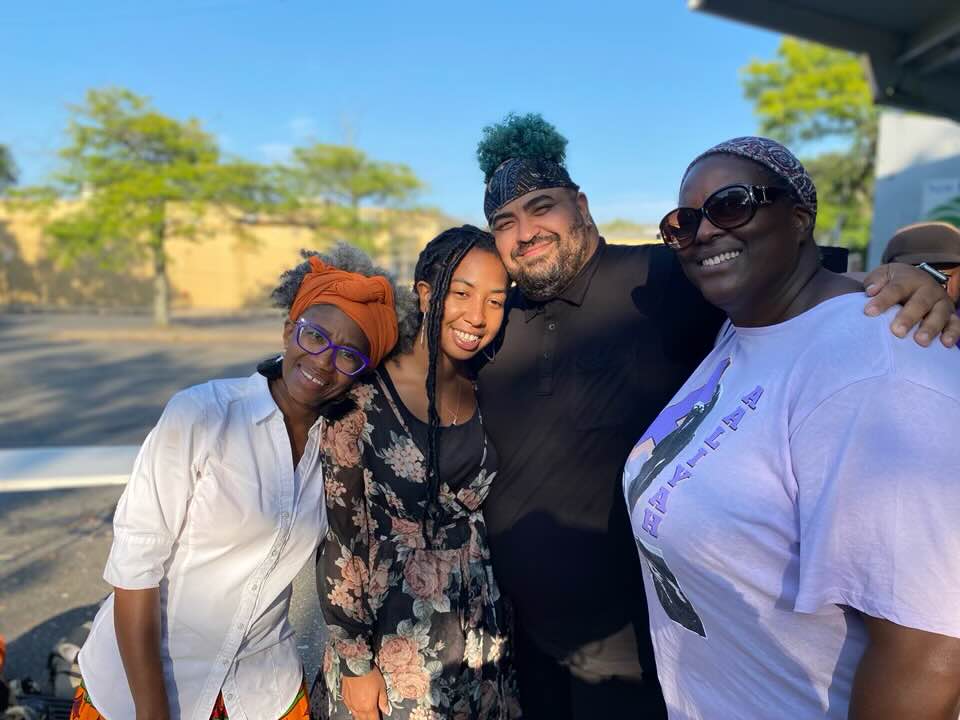
Culture & Community | Dwight/Edgewood Project | Arts & Culture | Yale School of Drama | Community Heroes | Arts & Anti-racism
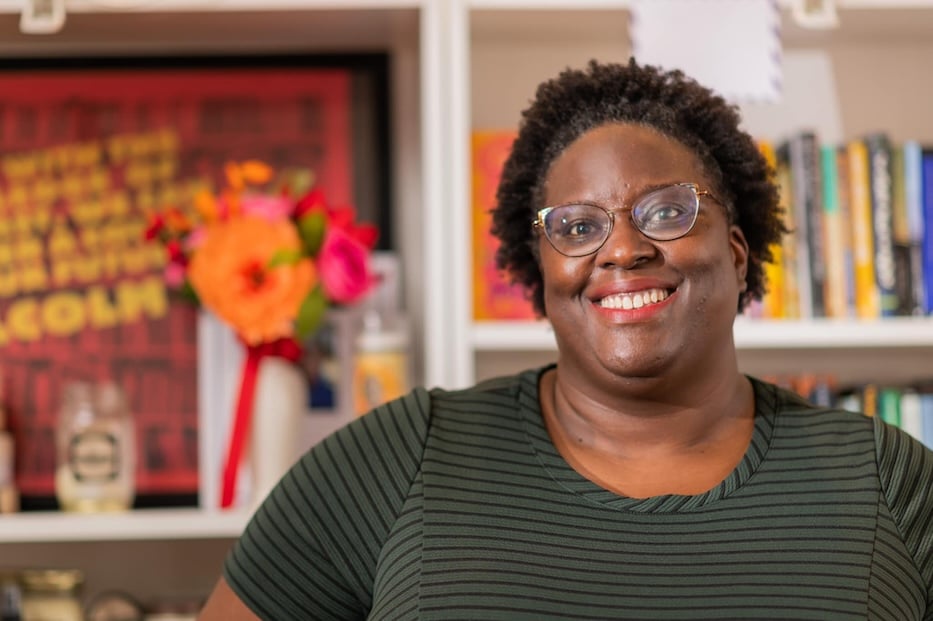
Emalie Mayo. Blaq Pearl Photography for Elm City LITFest.
Applause rang through the New Haven Pride Center, loud enough to reach the rafters and travel heavenward. People stood, one by one, until the whole room was on its feet. Within moments, cheers filled the space, floating from the floor to the ceiling.
It was a standing ovation for a life well lived, and cut short far too soon.
The moment marked a fitting—if surreal—farewell to Emalie Mayo, who died unexpectedly in her sleep earlier this month at 49 years old. A dedicated daughter, friend, arts advocate and truth teller, Mayo spent her life in service to other people, from students in the Yale School of Drama and Dwight Edgewood Project to Elm City LITFest, artEquity, and her elderly parents in New Haven.
In over a dozen interviews, family members, friends, and former colleagues remembered her as a bridge builder and sometimes the bridge itself, as sharp-witted and hilarious as she was kind. At the time she died, she was working as a senior administrative assistant at the Yale Library, a position she started in August of last year. Her memory is so much larger than that, stretching from downtown New Haven to Atlanta to Spring Glen to New York to New Orleans and beyond.
"It’s a shock," said her mother, Henrietta Mayo, for whom Emalie was the primary and often sole caretaker. When she found out about her daughter’s death, "I said, ‘she can’t be gone.’ This is the end of a beautiful life."
"To be in Emalie's orbit, there was just this aura of love," said Grace O'Brien, a senior administrative assistant at the Yale School of Drama who described her as "my best friend, my ride or die.
"When you were with her, you felt that warmth and that protection,” she added. “Emalie was like the wagon wheel. She was the center and we were all of the spokes. She connected us to so many different communities."
“An Amazing Legacy”
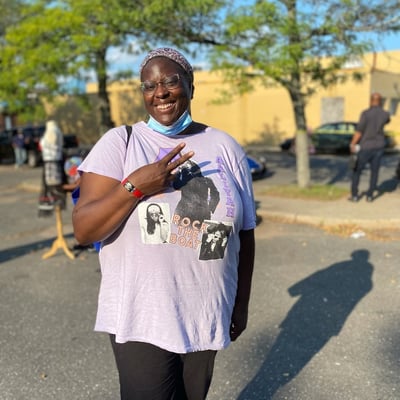
It seems that Mayo grew into that role from the moment she was born. The only child of Donald and Henrietta Mayo, she started her life as a shy and curious kid in White Plains, N.Y. where her family lived until they moved to New Haven in the 1980s. A voracious reader and star student, Mayo “wanted to try everything,” remembered her mother.
At school, she excelled academically and developed her interests in the arts from an early age. At home, she and her dad were inseparable, with a tight bond that lasted until his passing in 2023.
That dedication to her family never wavered, remembered her older cousin, Lisa Bolling. Growing up together, Bolling thought of Mayo as a younger sister, with whom she could (and did) keep secrets and speak openly about family matters. For decades, Mayo spent her holidays at Bolling’s home in New York, where she traveled for Christmas every year.
While she was never the loudest voice in the room, Bolling said, she was often the sharpest and the most hilarious, with witty retorts that kept family members on their toes. Mayo was also endlessly kind, folding weekly trips to IHOP and The Greek Olive into her parents’ schedule as their health began to decline.
“To lose Emalie at 49 years young is a huge shock to the family,” Bolling said, remembering how Mayo played with her 4-year-old grandson for hours on Christmas Day last year. “She had this unassuming, very warm spirit. It’s clear to me that she has been impactful to so many … She was and is an amazing person and left an amazing legacy.”
In New Haven, Mayo soared, even as she carried an increasingly heavy load. After studying psychology at Southern Connecticut State University (SCSU), she started her career as an office assistant in the development office at Yale University, quickly moving to the Yale Divinity School and then the Yale School of Drama. It was there that she ultimately earned the sobriquet “Dean Mayo,” for the love and respect she commanded from students.
In her day-to-day work, “Emalie was the hub of the program,” said Joan Channick, a professor of practice in and chair of the theater management department. But she was known much more widely as a cheerleader, checking in on students during and after their time at the school, and making sure her colleagues were OK. For some, she was the plug that connected them to FOLKS, the school’s Black affinity group. For others, she was that encouragement they needed to get out of the Yale bubble, or through a particularly hard semester.
Al Heartley, who graduated in 2018, remembered visiting Yale for the first time in 2015, and feeling himself relax when he walked into the department and saw Mayo smiling back at him. In a department with few Black students and fewer Black staff members, she was a constant reminder that he wasn’t alone. When he started at the university, she introduced him to FOLKS, where he found a powerful place to grieve the police killings of unarmed Black men the following year.
“Seeing this Black woman in the middle of campus, in this white space, was just a huge relief for me,” Heartily recalled in a phone call last week. “Once I got to YSD, she became pivotal to my experience.”
Her care extended to staff, with whom she built a tight-knit and unlikely community of care. Carmen Morgan, founder and executive director of artEquity, remembered first meeting Mayo in 2015, when she began her work as a lecturer at Yale. After years in national civil rights work, Morgan still felt out of place on the school’s fortress-like campus, where a historic legacy of white supremacy was and is still palpable. Then she met Mayo, and her sense of overwhelm dissipated almost instantly.
“In Emalie’s hands, I felt like, ‘I got this,’” she remembered. “That was it. That’s all it took. We became beautiful friends, and I could not really come to that campus and feel satisfied until I’d had a moment with Emalie. I can’t even imagine what it’s gonna be like going there without her.”
When Morgan started calling her “Dean Mayo'' some years later, it was a nod to how deeply and clearly students loved Mayo—and how she loved them back. While facilitating an anti-racism training on campus, Morgan watched as Mayo entered the room—usually closed to staff—and received an impromptu standing ovation. That’s just who Mayo was.
“Her Spirit Is Here With Us”
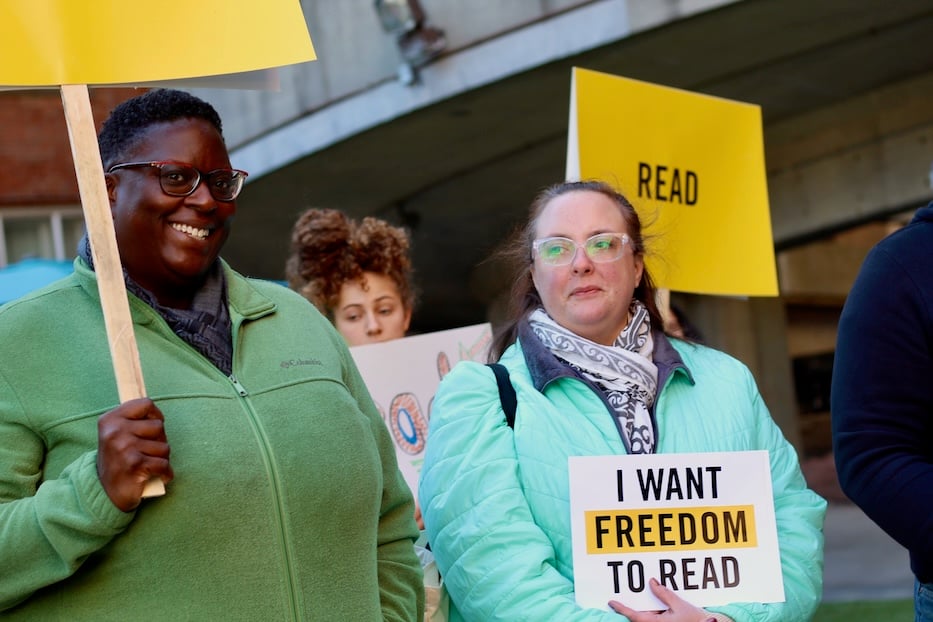
Mayo and O'Brien in November 2023, at a rally for the right to read in downtown New Haven. Lucy Gellman File Photo.
Mayo’s work also never ended at 5 p.m. For several years, her care for New Haven Public Schools (NHPS) students steered her towards the August Wilson Monologue Competition, where she was a mentor, judge, and faithful attendee. She attended nearly every performance School of Drama students were in, from the Yale Rep to Shakespeare in Edgewood Park to shows on and off Broadway. She shouted out alumni in real life and on social media, keeping track of which graduates were performing what, and where.
For the students, she had a reserve of energy and enthusiasm that seemed infinite. Years ago, Channick remembered, the two sat together at a late-night performance of Evil Dead: The Musical at the Yale Cabaret. They opted for the “splash zone,” donning Cabaret-issued ponchos before the show. By the end of the performance, both were splattered in fake blood.
“She was always game,” Channick said. “She was just in it. Every year during the theater management department’s orientation week, she would plan a fun bonding activity that was a kind of a learning moment … She was always game to help me figure out some activity to do. Her spirit was amazing. She was a life force.”
Mayo was also a safe place for students to land, with a kind of care for them that never stopped after graduation. Karena Fiorenza, now interim chief executive officer at Theater Communications Group, remembered meeting Mayo in 2010, during her first year as a theater management student at the Yale School of Drama. At the time, Mayo was still new to her position, and already exuded a kind of generosity and warmth that made her stand out.
As a Latina in a predominately white institution, Fiorenza saw Mayo as a steady presence, who looked out for all students, and particularly students of color. By her third year, the two were working frequently with each other through the Yale Rep, where Fiorenza was an associate managing director. When she graduated, they stayed in touch. They were texting each other just a few days before she died, about Mayo’s tentative plans to come out to Los Angeles and visit Fiorenza’s family.
“She kept checking in on me, and we just sort of built a friendship over time,” she said, remembering a visit Mayo paid her in Chicago when she lived there several years ago. We were part of each other’s world even from afar, because we were living cross country. I feel like her spirit is here with us.”
That spirit was most alive, perhaps, in the Dwight Edgewood Project, a collaboration among students at the Yale School of Drama and sixth and seventh graders at Barnard Environmental Science & Technology School (B.E.S.T). After earning a K-12 teaching certification in 2012, Mayo took over the program, transforming it as she recruited grad students, talked to classes at Barnard, and planned weeks of workshops, writing, rehearsal and final performances.
Channick, who watched her take on the program, called it “the most fulfilling part of her job”—and Mayo would have told you that it was too. Each spring, students at Barnard drafted, wrote, and rewrote one-act plays, working closely with a small army of graduate mentors at the School of Drama. Then in June, Yale students put on those plays with full lighting, projections, costumes, and actors.
Under her leadership, the program flourished. It was a place where imagination could and did run wild: princesses vanquished dragons and reclaimed their kingdoms, eight-legged cows time traveled and overcame their fears to save their families, fish rapped their way to reconciliation and sharks addressed their own mortality. Year after year, Mayo was the connective tissue of the program, and also the heartbeat that kept it fully up and running.
In one moment, she could locate props and recite all of their past lives, then turn around and plan a writing retreat for the whole group. In another, she could (and did, as this reporter watched multiple times) calm a crying or frustrated kid, and remind them that they were in charge of the situation. She maintained that there was no hierarchy: Barnard students’ voices were just as important as those that had Ivy League status. It was more than keeping Yalies humble, many alumni said: she reminded them of peoples’ shared humanity.
“It becomes a family really fast, and it’s like they’re all coming home,” Mayo said to me at a dress rehearsal in 2019, when performances happened in a little black box theater off Broadway Avenue. “It’s amazing to watch shy kids come out of being really, really quiet to being confident, taking criticism, and giving notes—that’s the backbone of the program.”
For many graduate students, it became a life-changing program (read more from Barnard students here, here, here, and here). Maya Louise Shed, who is currently completing a fellowship at Seattle Children’s Theatre, praised Dwight Edgewood as the strongest program—and the most community oriented—to come out of the School of Drama.
Last year, she served as Dwight Edgewood’s general manager, working with eight Barnard students and almost two dozen Yale graduate students. She saw, in real time, the way kids emerged from their shells as they helped build whole universes on a single stage.
“It is hands down the best thing that I have been a part of. Nothing comes even close,” Shed said. “I can’t even think of the words. To be able to see young people believe in themselves and their directing abilities and writing skills … it’s really an unmatched experience and it would not be anything without Emalie and the decades she put into it.”
“I thought it was one of the greatest gifts that Emalie could give us as students,” Heartley, who helped manage the project in 2016 and 2017, said. “The fact that these young people could say, ‘No, that’s not the way the magic carpet comes in.’ Or, ‘No, that star is not right.’ It was a night that every [student] playwright was able to join [Yale] students in taking a bow and being celebrated for the work that they created. Emalie saw the promise of what students at Yale could do.”
Playwright a.k. Payne, a School of Drama graduate and a teaching artist in the program last summer, remembered Mayo’s insistence on a lack of hierarchy. During her time as a graduate student, she’d been moved by Mayo’s kindness and warmth when the two overlapped at the Yale Repertory Theatre. Watching her work with young people added a whole new dimension to it.
“She was so passionate about that work,” Payne said. “She refused to betray anybody’s humanity in the name of professionalism.”
“Such A Light”
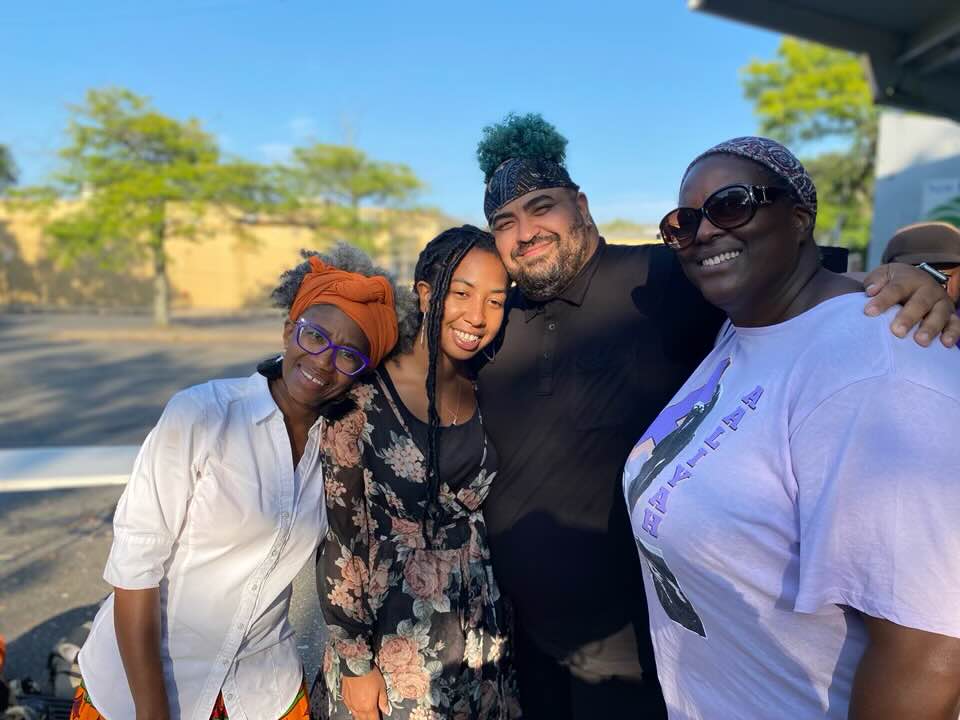
IfeMichelle Gardin, Shamain (Sha) McAllister, Julius LaVaughn Stone Jr. and Emalie Mayo—the LITFest dream team—in 2021.
Outside of work, Mayo was a caretaker, sister-friend, mentor and confidant to dozens of New Haveners, with a footprint that extended far beyond the Elm City. O’Brien, who first met her in 2011, saw Mayo as the best friend who could keep her accountable in one breath, and make her laugh hysterically in the next. When they spoke—which was near daily—she knew Mayo would not mince words, but deliver whatever she had to say with a candor that showed how deeply she cared.
In meetings at the School of Drama, the two often sat side by side, O’Brien with a notebook in front of her. If she said something that Mayo found surprising or inappropriate, she would leave a tiny check mark on O’Brien’s notepad. “It was with love,” she said. “She was encouraging me to keep me growing.”
Mayo’s encouragement worked, as it did for so many. Within years of their first conversation, she and O’Brien were attending protests together, from the Women’s March in Washington, D.C. to a New Haven rally against banned books last November. When Mayo left the School of Drama for Yale’s library system last year, even that felt like too far a distance. Now, O’Brien said, she’s struggling with the magnitude of Mayo’s loss.
At a packed celebration of Mayo’s life last weekend, dozens echoed that feeling, urging attendees to honor their friend’s legacy with acts of fierce friendship and community care. Cristal Coleman, a financial assistant supervisor in the Yale Library system, remembered her as a sort of little sister, always eager to catch up over a meal or see a play with friends in tow. After the two met at Yale 16 years ago, they remained extremely close, no secret too big or heavy to share.
“We were Frick and Frack,” Coleman said, remembering the all-encompassing hugs that Mayo would give when the two said goodbye to each other. Earlier this year, Mayo supported her as she launched a small business from her home. The week Mayo died, she had been organizing a girls’ trip to see The Hot Wing King together at TheaterWorks in Hartford. Coleman said she’s still in disbelief that the two will never see another play together.
“This has just been devastating and shocking,” echoed Madelyn Ardito, a theater educator who saw Mayo as a friend and mentor. “She is such a light. We’ve all got to live and love fully, especially in her honor.”
Spreading Her Wings
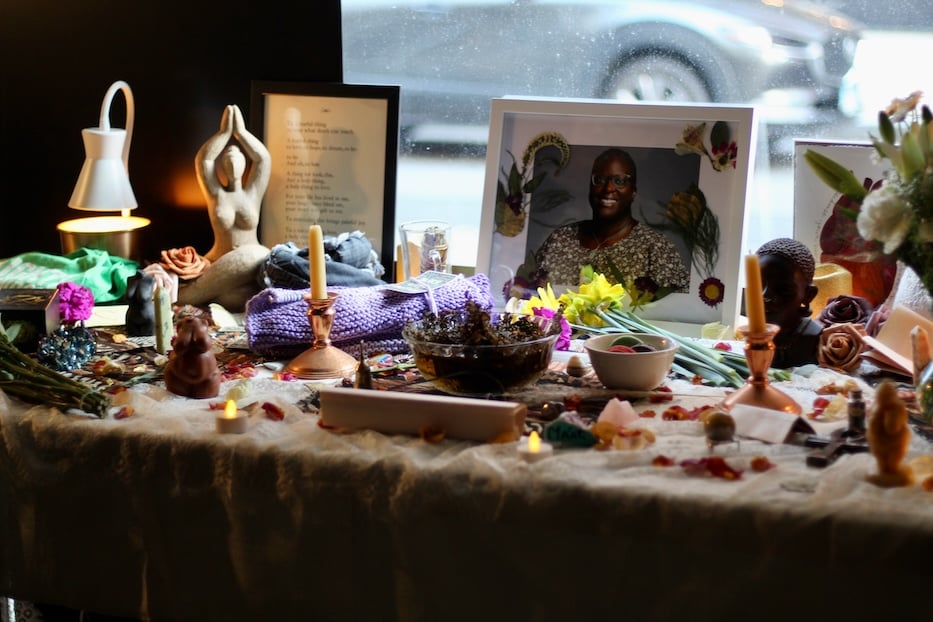
Lucy Gellman Photo.
In the last five years of Mayo’s life, there was a sense among her friends that she was spreading her wings, even as she poured herself into care for her aging parents. In 2019, she started training to become a facilitator with artEquity, doubling down on an already-vocal commitment to anti-racism. Morgan, who had by then known Mayo for four years, remained in constant awe of how fully she showed up and advocated for those around her.
She remembered birthdays and anniversaries, names of parents and babies, who was among the living and who had passed on. She checked in on people, even if people weren’t checking in on her. When Covid hit New Haven in March 2020, she kept track of who needed what, including a listening ear. Despite carrying a heavy weight—particularly after the death of her father last year—she reminded her friends to stay safe and take care of themselves.
“How did she find the time to give so much love so authentically, so deeply, to so many people?” Morgan mused in a phone call. “Emalie had deep friendships, and wide! She had the breadth of relationships and also the depth.”
Hope Chávez, now executive director at the Arts Council of Greater New Haven, agreed. When the two first met through artEquity in 2019, Chávez was an artistic producer at Long Wharf Theatre, and Mayo became her guide to New Haven. Four years later, Chávez got to watch her work as a mentor in the New Haven Artist Corps, guiding a cohort of artists through their projects. What struck her, time and again, was the deliberateness with which Mayo spoke.
“She was never the loudest voice in the room, but she really was intentional and thoughtful [in] what she put her voice and weight behind,” said Chavez, who is now working with Mayo’s family to set up an arts-focused scholarship in her name.
While working with artEquity in 2019, Mayo also joined IfeMichelle Gardin and Shamain McAllister as they began to build Elm City LITFest, a book festival dedicated to literature of the African diaspora. When Covid-19 derailed their plans for a 2020 in-person festival, Mayo helped brave the virtual pivot, building a new website and podcast series that brought on authors, playwrights, poets, and book club founders.
Gardin, who returned to New Haven years ago to care for her own mother, said she could see how much Mayo was carrying—and was amazed by her ability to show up again and again for others. Within months, she had become not only part of Mayo’s support system, but also her friend. Some of her best memories are conversations that would unfold at her home, where the three could sit and talk for hours.
Mayo’s connection to the School of Drama—and belief that it should not be a silo—is also how LITFest landed speakers like Payne and Tarell Alvin McCraney.
“I never knew there was such an array of beautiful people who wanted to come outside [Yale],” McAllister said to knowing laughs at a celebration of Mayo’s life. “She was such a bridge. The people at that school need to put respect on her name.”
While LITFest may have been her most visible community outreach, Mayo helped shepherd multiple arts communities through the pandemic, and often showed up as an activist as well. In 2020, she helped plan Hamden’s inaugural Black film series, a collaboration with Best Video Film and Cultural Center (BVFCC), Hamden’s Department of Arts and Culture, and Spring Glen Church. She became part of a group of theater educators who met via Zoom, and later joined each other for lunch to check in.
The hardest part about her death, friends said over and over, is how much life they—and she—thought she had left. When the world began to reopen in 2021 and 2022, Mayo started traveling, including a trip abroad with a group of women she had never met, focused on healing. At an artEquity reunion in New Orleans last year, Morgan remembered, she was the first person to jump in and start dancing behind the mellifluous second line.
Her creativity was blooming, too. In 2021, Mayo received a REACH (Racial Equity + Creative Healing Through the Arts) grant for “Playmaking New Haven,” a new initiative inspired by the Dwight Edgewood Project. There was enough funding to pilot the program for two years; she just needed more time. After delaying its start to care for her parents, she was set to return to it this summer.
“Themes of racial/social justice and liberation will be at the forefront as we build a beloved community that will learn, teach, and grow together,” she wrote to a group of co-conspirators and fellow artists in August 2021. “Participants will tell stories through playmaking, songwriting, filmmaking, puppetry... whatever brings them joy, and their work with be showcased for the community.”
In a phone call last week, Coleman said that Mayo’s passing has reminded her not to put off anything she wants to accomplish before she leaves this planet. When reflecting on her friend’s life, she said that the words “live” and “love” feel most urgent to her. In Mayo’s loss, there’s a reminder to live fully and gently in the present, because nothing else is promised.
On an altar built in Mayo’s memory, friends had the chance to grieve the multitudes she contained, and leave their own items to remember her by. By the end of the day, it was topped with candles, fresh and dried flowers, half-finished knitting, tarot cards, vibrant photographs, plants and a folded Dwight Edgewood Projet t-shirt. Ala Ochumare, who erected the altar, considered it a form of paying homage to a recent ancestor, with a reminder t honor Mayo’s legacy.
“We are the living commitment and embodiment of everything Emalie stood for, stands for,” said Ochumare, learning institute coordinator at the New Haven Pride Center and a co-founder of Black Lives Matter New Haven. “She saw you even when you didn’t see you. We are now tethered to an ancestor … she’s done so much that no one else could have done.”
To support Mayo's family or share a memory, visit her Caring Bridge site here.

